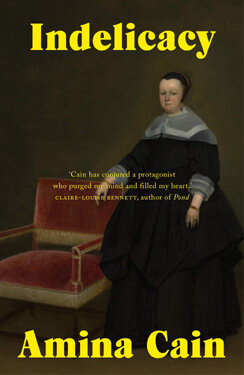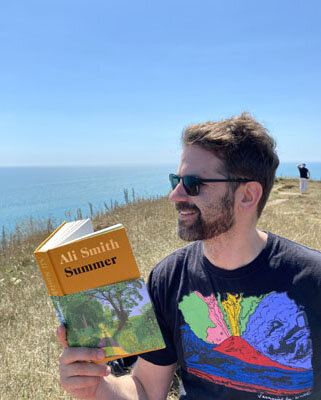What a journey! I've probably devoted more time to Mantel's Cromwell trilogy than I have to any other series of books since I not only read all 2,009 pages of the novels but also biographical and historical writing to better understand this time period. Though it required a lot of concentration and effort it was definitely worth it. I'm going to miss Cromwell whose soul searching odyssey and unprecedented influence as righthand man to the King comes to a heart-wrenching conclusion in this final book.
There's a building tension which Mantel incrementally ratchets up and impressively maintains as Cromwell's enemies increase and the politics become so heated over the course of this long novel. Factions within England plot against the ruling monarch amidst the new religious divide and the country's relations with other European nations always feels delicate. Although great promise comes with Henry VIII's new wife Jane Seymour, the King's dynasty is still not secure. The unashamedly classist English noblemen also grow increasingly resentful of Cromwell's influence and power; they never let him forget he's merely the son of a blacksmith without noble lineage. So there's a lot at stake. Mantel uses many fascinating historical details to describe this complicated period of time and bring it alive. It does take patience to follow, but Mantel tempers her narrative with a fantastic humour which prevents the story from becoming dry.
There's so much tantalising banter and innuendo between characters in the royal court or whispered in shadowy corners. This includes speculation about what happens in the royal bed, accusations of treason and hints about shifting loyalties. The dialogue is very funny and kept me consistently engaged, but it goes beyond mere gossip as Mantel shows how politics is so often about the spread of rumours whose presence gradually takes on such weight that the truth becomes irrelevant. It's what leads to countless (many innocent) people being imprisoned and executed in these novels. As was noted in “Bring Up the Bodies” those in power must also rewrite history to suit the ruling force's narrative and objectives going forward. So although this is a story very much rooted in the past, I can see parallels to how our current leaders use similar techniques to craftily mould the narratives of nations to suit their purposes.
As with the previous novels, although this story is closely based on history and the larger outcomes are known, Mantel includes a lot of surprising facts and occasionally she slightly tinkers with some of the historical elements to make Cromwell a more dynamic character. There are several shocking twists in this novel which are so engaging and add to the complexity of the story. One of the most notable is a figure who appears that Cromwell didn't know existed. But there are also delightfully weird details such as how Henry was in disguise when he first met Anne of Cleaves. So I found this a suspenseful story with many sumptuous elements. It's also obviously more emotionally involving than a reading a historical account as we follow Cromwell's emotions and the path of his thoughts as Mantel imagines them.
The author has a tremendous talent for writing about how the ethereal can intrude upon our psychological reality. As both Henry and Cromwell have got older over the course of the novels, the dead have a stronger presence in their lives. It's even noted how “He thinks the dead are crowding us out.” Naturally, their presence is felt more keenly when there are feelings of guilt and regret associated with those who have died and both protagonists wrestle with these unresolved emotions. Mantel has a fantastic way of creating an eerie atmosphere where the presence of the dead make themselves felt. It also gives a different perspective on history because if those people had lived the fate of many and the state of the nation would have had such a different outcome. Part of the tension is that in the moment obviously none of the characters knew what was going to happen and with so many potential ways that events could twist the reader feels their intense struggle to decide what to do. Of course, we have the privilege of knowing the ultimate outcome but in reading this novel we can see potential alternative histories such as if Jane Seymour had lived and convinced Henry to reconcile with the Pope.
However, the biggest point of tension in this particular novel is between Henry and Cromwell. While Thomas has always been a faithful servant, the King can't help being swayed by the whispers being made against him. Figures such as the crafty diplomat Chapuys ominously warns Cromwell about the perilousness of his position since he entirely relies on the King's favour. Equally, Thomas seems to develop a more refined understanding of Henry's position since no matter how close and personal their relationship becomes Henry is a monarch whose role occludes his state of being a mortal man. Thomas insists “What should I want with the emperor if he were emperor of all the world? Your majesty is the only prince, the mirror and the light of other kings.” But Thomas also realises that no matter how faithful he is “If Henry is the Mirror he is the pale actor who sheds no luster of his own but spins in a reflected light. If the light moves, he is gone.” It's only through exercising his deadly power that Henry is able to maintain his position as the absolute monarch. Thomas knows that “This is what Henry does. He uses people up. He takes all they give him and more. When he is finished with them he is noisier and fatter and they are husks or corpses.” Again, I couldn't help thinking of modern equivalents of tyrannical powerful figures such as the current US president or Rupert Murdoch whose colleagues often end up in jail and whose multiple children from different wives form a dynasty.
One of the most obvious questions with a novel this long is: does it justify its length? Certainly some sections felt slightly extraneous to me. Drifting too far into a side plot with yet another character I had to struggle to recall somewhat diluted the power of the central story. There's such a profusion of tales and fascinating figures surrounding this period of royal history that it must have been difficult for Mantel to sift through which ones to include and what to leave out. For instance, the story of Margaret Douglas and Thomas Howard could form a novel in itself and I wanted to know more about them. I can't really begrudge Mantel leaving it in because I'm sure if I reread the novel these characters would come more into their own, but perhaps including so many characters demands more patience from the reader than it needs to. I also think that reading this novel without having read the first two books would really lessen the impact of the story because many parts refer back to scenes from the earlier novels and the narrative assumes the reader is familiar with them too. Additionally, you really need to have read the two previous novels to fully see how Cromwell's character develops over the course of the series and why horrific scenes and figures from his childhood continuously haunt him.
Reading this magnificent series of books is such a worthwhile experience. If you're like me and feel slightly hesitant about how much they might demand from the reader I can assure you they certainly deserve the investment of your consideration and time. It's no accident they are so lauded and widely loved. The story of Henry VIII and his wives has been told and retold so often it seems nearly mythological, but by approaching the politics and meaning of this historical period through the lens of Thomas Cromwell is a brilliant way to explore the workings of power. It also reimagines the heart and mind of an individual who endured so much hardship and trauma I fell in love with his story. Mantel's writing shimmers with so much insight and beauty that becoming immersed in this historical world is a deeply pleasurable experience.
You can also follow a journey I took to the Tower of London while discussing this novel here: https://www.youtube.com/watch?v=HqAq-XYYiwg
























